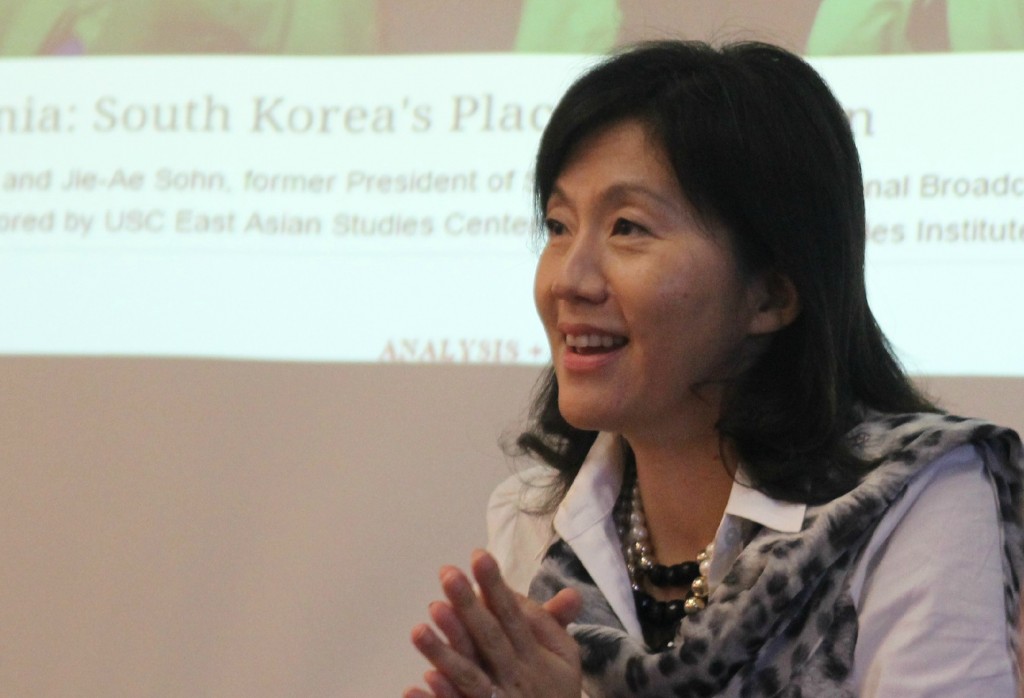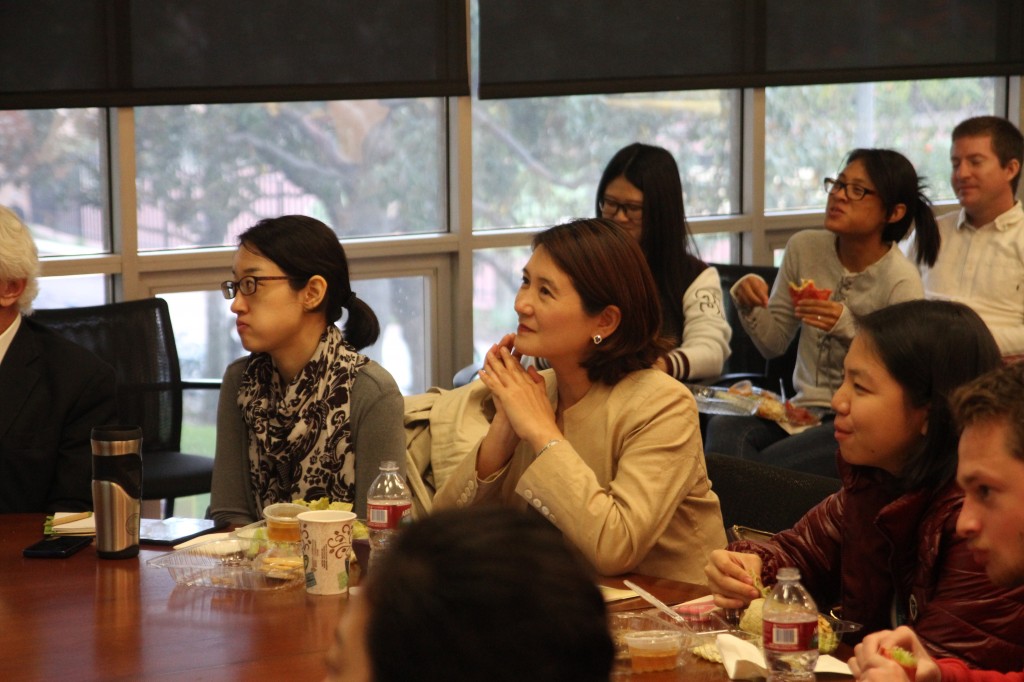- California Assembly OKs highest minimum wage in nation
- S. Korea unveils first graphic cigarette warnings
- US joins with South Korea, Japan in bid to deter North Korea
- LPGA golfer Chun In-gee finally back in action
- S. Korea won’t be top seed in final World Cup qualification round
- US men’s soccer misses 2nd straight Olympics
- US back on track in qualifying with 4-0 win over Guatemala
- High-intensity workout injuries spawn cottage industry
- CDC expands range of Zika mosquitoes into parts of Northeast
- Who knew? ‘The Walking Dead’ is helping families connect
Former Arirang president: K-pop is fueling Korea

Former Arirang President Sohn Jie-Ae speaks inside the University of Southern California’s Annenberg School for Communications & Journalism. (Cosmo Scharf/USC Center on Public Diplomacy, USC East Asian Studies Center, Korean Studies Institute)
By Tae Hong
“When I was young, we’d tell people we were Japanese, because it was cool to be Japanese at the time,” the former president of South Korea’s only English-language government-affiliated network, Arirang TV, told a crowd inside the University of Southern California’s Annenberg School for Communication & Journalism Wednesday.
Her point? It’s now cooler to be Korean, all thanks to a little craze called K-pop.
Sohn Jie-Ae, dubbed one of the most powerful women in Asian media until her March exit from the network, spent an hour providing anecdote-filled, firsthand insight into Korea’s booming pop culture for a discussion titled “K-pop Mania: South Korea’s Place Under the Sun.”
The event was organized by the USC Center on Public Diplomacy and co-sponsored by USC East Asian Studies Center and the Korean Studies Institute.
In front of K-pop enthusiasts and interested attendees alike, the former CNN Seoul bureau chief and Blue House overseas press secretary introduced a short history of the rise of Korean culture across the globe.
The phenomenon commonly called “Hallyu” boosted South Korea’s international image from its failure to register on people’s radars to becoming one of the hottest centers of pop culture in the world, she said.
After all, it’s 2014, and Tokyo-brand cool’s got a lot of catching up to do — Korean culture’s infiltrating global airwaves, video games, hip food scenes and, most importantly, Internet culture.

Attendees listen to a talk given by Sohn Jie-Ae at “K-pop Mania: South Korea’s Place Under the Sun” at USC Wednesday. (Cosmo Scharf/USC Center on Public Diplomacy, USC East Asian Studies Center, Korean Studies Institute)
Twenty years ago, when Sohn signed onto her role as a CNN Seoul correspondent, the country was in the midst of a transition to unprecedented transparency following the imprisonment of two former presidents.
It was on the cusp of a pop culture revival a la first-generation idol groups and the early stages of the Internet, but also headed toward a crippling financial crisis that would sweep Asia through the late 1990s.
While covering Korea and its society’s maturing into one of the world’s developed countries during her years as a journalist there, Sohn also witnessed the birth of Hallyu.
In 2002, the television drama “Winter Sonata” hit the airwaves. Within months, buses filled with middle-aged Japanese women were visiting Korea to see the filming locations for themselves. They swooned over leading actor Bae “Yon-sama” Yong-joon and wanted to sit on the benches he’d sat on, go to the places he’d been.
“I could see where it was headed,” Sohn said. “It was becoming something that was really a trend.”
By the time she agreed to head Arirang in 2011, K-pop and Korean pop culture had grown beyond even her imagination, fueled by smart marketing by industry giants like SM Entertainment and YG Entertainment whose products — hundreds of feel-good singing and dancing machines with catchy tunes and good looks — had been proliferated to a global audience via the Internet.
She’s since seen firsthand the pandemonium that unfolds at international airports upon K-pop star arrivals; she’s been astounded at record-breaking Twitter participation numbers that once stemmed from inviting K-pop band EXO onto an Arirang program; and she’s now convinced that this trend is and will continue to be the driving force behind Korea’s rebranding as a country.
The best thing the Korean government could do is to lay its hands off K-pop as it balloons, she said. She sees it as an industry-fueled, fan-driven trend.
“If anything, what the government is doing is trying to capitalize on the popularity and the good feelings K-pop has to really raise the image of Korea,” Sohn said. “It’s not [the government] trying to fuel K-pop, but K-pop fueling Korea.”
Now a visiting scholar at USC and focused on figuring out answers to how public diplomacy fits into Korea’s image rebranding, Sohn said it’s time for her to gain a broader perspective in respect to where Korea should go.
That includes its pop culture, she said.
“I think K-pop has a bigger life than any one person or one government can control. You think about, how do we utilize K-pop to get the young people who are hooked on it to then be hooked on other aspects of Korea?” she said. “We need to try to see what positive influence K-pop can have on the rest of Korea.”
















Pingback: Arirang Korean And Japanese Restaurant | finder - restaurant finder